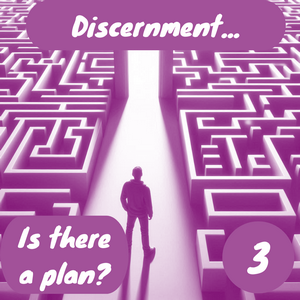Craig
We can’t end a discussion about the will of God before we give some careful thought to what we actually mean by “God”. For as long as my view of God was defined by what I now think of as ‘solid’ character traits (all knowing, all powerful, all wise, etc.) I was content with fairly simple equations. God has a plan which is pretty clear and straightforward, and if we would only keep to it everything would be fine. If I am honest, for as long as this pretty simplistic view dominated my imagination I was a pretty angry person. Of course, I tried hard not to display this outwardly, but my inner Pharisee was always just below the surface. The only possible solution is either to go back to the way things were or strive hard to make everything the way it should be.
As my self-awareness grew, the harder it became to blame others for my own anger. And as I watched Jesus closely I came to see that, using the logic I have just described, of all people he should have been far more angry than me at the way others had defined God in their own image. But I could see no signs of aggression in his words and actions, even the passive kind. If Jesus only does what his father is doing, it didn’t seem to me that God made the kind of plans I wanted him to, or that she* remains eternally resentful when we screw things up so badly.
So, by watching Jesus, I had to revise my understanding of God. I began thinking more deeply about a God who has three natures: God as a truly relational being. That led me to realise that the relationships I valued most weren’t based on rules and stark consequences. Whenever I relate to my adult children I still expect to be disappointed or challenged by choices they might make, but in my desire for them to experiment and flourish I am confident they will learn, and that they will also show me better ways of being in the world.
This kind of thinking frees me to see scripture not as a grand plan that must be obeyed, but as a record of other humans living imperfect lives. Sometimes deliberately turning from godly wisdom, and often simply struggling with their desires and dreams. All of it is recorded for us to learn from.
Roy
The monastic tradition has taught me so much about the value of contemplation in relation to discernment. Decisions taken in haste, driven by perceived urgent need for action have rarely proved to be wise decisions. The best decisions that I, individually and together with others, have come to have usually passed through the process of contemplation, careful consideration, prayerful reflection and communal discernment that has engaged both head and heart. Giving permission for our rational and objective thoughts to be complemented by the heart, our feelings and emotions.
The monastic tradition has also introduced to me to the value of Ignatian spirituality with its focus on discerning the spirits. Consolation, that interior movement of the heart that gives a deep sense of connection with God, others and our authentic self. Desolation in contrast, a loss of a sense of God’s presence. These are not simply emotions, they are deep inward realities that alert us to that which is true and false within our consciousness.
*
This extended series on discernment will now take a summer break during which members of the Collective will be resting, and also beginning to prepare for a retreat day in Harrogate in the autumn and gathering material for a new course on Leadership at Cliff College.
If you can’t wait until August, you might like to visit Simon and Craig’s personal blogs here:
Simon: https://substack.com/@agodwecouldbelievein
Craig: https://craigmillward.substack.com/
We wish you a restful summer.
* Apologies if this reads clumsily. I know it frustrates some people but I think it is essential that, even if we are content to use masculine pronouns, we must never slip into imagining God as embodying what we might think of as male characteristics.


